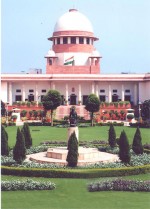The Supreme Court on Monday has directed the relevant authorities to finalise their proceedings against delinquent government employees within a maximum period of 90 days. The Court raised concerns about the protraction of suspension periods of delinquent government employees which has become a deep rooted malaise within the bureaucracy. The Court observed that such a baleful practice needs to be curtailed.
Noting that the employees embroiled in the limbo of prolonged suspension, suffer from disrepute and ignominy, the Court said that the effect of the suspension order should not extend beyond a period of 90 days. The delinquent officer or employee should be served with the chargesheet/memorandum of charges within this period since the suspending an officer or employee before drafting a list of charges or chargesheet against him, is meant to be a transitory measure of short duration.
A bench of JusticesVikramjitSen and C Nagappan was hearing a petition filed by defence estate officer Ajay Kumar Choudhary, who had been suffering due to protracted suspension. He had been suspended in 2011 after being accused of issuing faulty NOCs granting the use of nearly 4 acres of land in Kashmir.The bench said that the temporary suspension of government employees become punitive and onerous under two conditions-1)when it is for an indeterminate period or, 2) when it is renewed without any sound and reasonable basis (“contemporaneously available on record”) for doing so.
Further, the Court observed that prolonged sentences of suspension, being renewed again and again without sound reasoning or logic should not become the rule. Such periods of suspension ought to be the exception. The suspended officer or employee has to suffer great ignominy, disrepute and scorn. Though he is temporarily suspended before even being officially charged with the offence or misdemeanour, he is looked at by his colleagues with derision and looked down upon by the society. As if this ordeal is not excruciating enough, a barge of insinuations and allegations are levelled against him, all even before he is even charged with an offence formally. The Court noted that the suspended employee is further tormented by the fact that when he is charged formally, the inquiry/inquisition against him will take a considerable amount of time to come to conclusion, even though the end result may ultimately be a judgment vindicating his innocence in the matter.
The Court noted ruefully that this temporary but protracted suspension often becomes a source of great consternation and ultimately the reason of premature retirement. The Court repeated the oft quoted argument that the Constitution of India does not openly and expressly guarantee the right to speedy trial to the incarcerated or the right to be presumed innocent until proven guilty.
The Court observed that in light of the findings in the verdict, it is open to Mr.Choudhary to challenge his protracted suspension in any way possible in law, even though the appellant has already been presented with the chargesheet. The Court noted that even though the findings in the given case may not apply to the appellant any more, the action of the respondents will be amenable to judicial review.
by Siddhartha Singh.

